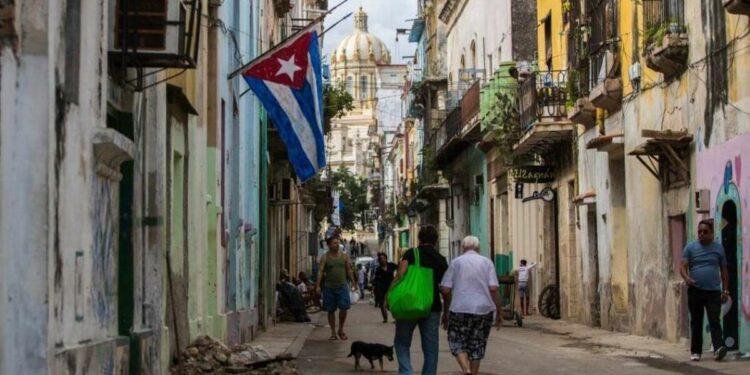Before he left office in 2021, then President Donald Trump put Cuba back on the state sponsors of terrorism list. It was largely viewed as a political favor to Cuban exiles. Now, just days before leaving office, President Joe Biden removed Cuba from the list — and Cuba has pledged to release 553 political prisoners.
During an interview Friday on WLRN’s South Florida Roundup, former Miami Congressman Joe Garcia, a Democrat, said the administration’s actions are bringing about the largest release of Cuban political prisoners in decades. Garcia helped push for the move behind the scenes.
Playing a central role in this prisoner release arrangement: The Vatican.
All the parties involved say this was not a quid pro quo deal. But does it lay some Cuba negotiation groundwork for incoming President Trump?
Garcia talks about the administration’s actions and discusses the future of U.S.-Cuban relations under the incoming Trump administration. The interview has been edited for brevity and clarity.
READ MORE: Cuba releases a prominent dissident as part of plan to free more than 500 prisoners
PADGETT: Explain to us, Congressman, what brought about both the U. S. move to take Cuba off the list and Cuba to begin releasing half of the more than 1,000 political prisoners on the island, some of whom were already freed Thursday, like prominent dissident Jose Daniel Ferrer.
Well, I think this was the position that the Biden administration gave the Cuban authorities. Clearly when Joe Biden got elected, many of us thought that he would try to produce more results on opening, something that was very successful in the Obama administration in creating much more space. Unfortunately the events of [July 11, 2021, protests] happened and over a thousand people were incarcerated. Many of them, very young men and women. And that basically solidified the sort of status quo on Cuba-U.S. relations and those of us that had offered this to the Cuban regime said, look, release the political prisoners. Five hundred and fifty-three is what we knew for a fact were in jail from ‘J-11’. I think this non-deal deal, which of course is a deal, [Thursday] produced a larger group of people [to be released] and this total group is the largest single release of prisoners since Jimmy Carter in 1978, which was 3,000.
But, both Cuba and the Biden administration insists this was not a quid pro quo deal. Cuba insisted is not releasing these political prisoners in response to the state sponsors of terrorism delisting. And vice versa, the U.S. insisted is not taking Cuba off the terrorism list because of the prisoners. Why was this so important?
The Cubans make the false argument that these people were in jail purposefully and that the Biden administration, to give the Cubans cover, basically says ‘all right, they’re doing it for their own reasons and we’re doing it for our own reasons.’ But, clearly this was timed this way. This was done this way and since I’m not a member of the Biden administration, I can tell you this was a deal. That’s why you’re about to see the largest release of political prisoners since 1978.
Congressman, the big question now is whether incoming President Trump will move quickly to reinstate Cuba on the U.S.’ state sponsors of terrorism list. Even if Sen. Marco Rubio and the incoming Trump administration do believe that Cuba is a state sponsor of terrorism, do you think they’ll move quickly then to reverse President Biden’s decision to take Cuba off that list?
Forget about what the U.S. side has to do, because it’s neither here nor there. If the Cubans stopped releasing people when they said it had nothing to do with the deal, then we know that they were both lying. Listen, there’s a lot of hypocrisy going on here, both by the U.S. government that knew the Cubans shouldn’t be on the terror list, and by the Cubans who denied they had anyone in jail for a very long time. And so, what we got here is what we could get, which is the release of 553 people from jail.
You’re also hoping that these developments could help prompt the U.S. to help the ever-growing number of Cuban migrants here who are fleeing Cuba’s crisis. What is the immigration document or status help you’re urging the federal government to extend to Cuban migrants in that regard?
I hoped I would have brought good news, but friends and I were speaking with the White House and they’re not going to be granting a parole in place for the almost half a million Cubans who have an I-228 status, which doesn’t allow them to get to the Cuban Adjustment Act. So, I’m hoping that Donald Trump and, in particular since the Cuban community — at least part of it — has been so supportive, I’m hoping he can grant that parole in place. I think the administration and the homeland security secretary have a perfect authority to do.
You can listen to the full conversation above or wherever you get your podcasts by searching: The South Florida Roundup.
Source link : http://www.bing.com/news/apiclick.aspx?ref=FexRss&aid=&tid=678ea11b6a8940afa8271bc4c7b18e22&url=https%3A%2F%2Fwww.wlrn.org%2Fgovernment-politics%2F2025-01-20%2Fbiden-removes-cuba-terror-list&c=11989672013671635666&mkt=en-us
Author :
Publish date : 2025-01-20 06:03:00
Copyright for syndicated content belongs to the linked Source.







